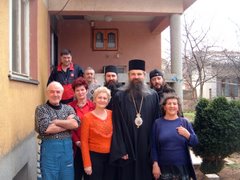Serbia's Step Forward is To Defend Her Sovereign, Civil, International and Territorial Rights
February 05, 2008.Source: The Washington Post
The Diocese of Ras-Prizen and Kosovo-Metohija is bringing the article '' Serbia's step forward'' published in '' The Washington post'' and reaction of His Grace Bishop Artemije on it.
Serbia's Step Forward
Reelected President Boris Tadic has a mandate to move toward Europe.
Tuesday, February 5, 2008; Page A18
The outcome of a presidential election in Serbia on Sunday has opened the possibility that the United States and its European allies might be able to take some long-delayed steps toward stabilizing the volatile Balkan region, site of a decade of bloody wars during the 1990s. The vote was partly a referendum on how Serbia should respond to the imminent declaration of independence by the province of Kosovo, which was freed from Serbia nine years ago by a U.S.-led NATO military campaign. Incumbent President Boris Tadic said that Serbia should continue to move toward integration with the European Union even if leading European governments recognize Kosovo, as they are planning to do. His opponent said Serbia should turn its back on the West and cast its lot with Russia, which has been aggressively nurturing Serbia's poisonous nationalism.
Luckily for the Balkans and for Europe, Serbs chose the path of Western integration; Mr. Tadic won. The president hopes to sign an agreement on expanded cooperation with the European Union, allowing more trade, visa-free travel and the prospect of eventual E.U. membership for Serbia. Though Mr. Tadic and the Serbian government will loudly protest Kosovo's independence declaration, that long-overdue event is now less likely to lead to violence.
That doesn't mean Serbia's path will be easy: Every step the former Yugoslav republic takes toward joining the liberal democracies is tortured. Mr. Tadic still must overcome the resistance of his party's coalition partner in parliament, Prime Minister Vojislav Kostunica, a nationalist hard-liner who has also called for a rupture with Europe over Kosovo. Moscow will surely continue its effort to detach Serbia from Europe and make it a vassal state; last month, the Russian state energy monopoly Gazprom bought a controlling interest in Serbia's entire oil and gas industry.
Mr. Tadic and his liberal allies have a tendency to ask Western leaders to appease the nationalists, such as by putting off Kosovo's independence or by dropping demands for the extradition of war criminals. Now that he has a clear mandate from voters, Mr. Tadic ought to insist on his own agenda -- for example, by demanding that Mr. Kostunica either support an agreement with the European Union or resign and face the voters himself. The West can help by working to ensure that the ethnic Serbian minority in Kosovo is secure and treated fairly once independence is declared. Both the European Union and NATO should aim to integrate Serbia as well as Kosovo and their neighbors - Albania, Crotatia, Macedonia and Montenegro -- as quickly as possible. When Serbia chooses the West over nationalist isolation, it should receive a favorable response.
AND HERE IS REACTION OF BISHOP ARTEMIJE
As archpastor of the Orthodox Christian people of the Serbian province of Kosovo and Metohija, I feel compelled to respond to any false impressions that may be created by the recent editorial "Serbia's Step Forward," February 5. In particular, it would be inaccurate to suggest that the recent presidential election between Boris Tadic and Tomislav Nikolic was a choice between the European Union and Russia, or that it was in any way a referendum on separation of Kosovo from Serbia.
With regard to the first, Serbia will maintain its evenhanded and moderate policy based, to the extent possible, on friendly relations with both West and East. During the campaign, Mr. Nikolic made a point of keeping open Serbia's eventual orientation toward the EU, though of course any recognition of Kosovo's independence by EU countries would have a negative impact on our relationship. By the same token, Mr. Tadic recently was in Moscow for the signing of a major Serbian-Russian energy agreement.
With respect to Kosovo, there should be no mistake that both candidates categorically maintained that Kosovo is Serbia and will remain so. While Serbs may be disagree as to the exact response should some governments, including the United States, continue with the reckless course of encouraging an illegal independence declaration and recognition, there should be no mistake that we will defend our people and our national territory with all means available to any democratic country. If the Albanian separatists, with U.S. support, make good on their threats to compel my flock to submit to their illegitimate authority, and use force against the lawful institutions of the Serbian government in Kosovo, a cycle of stepped-up violence, not of our choosing, will result. We hope that before such an unnecessary crisis is unleashed, a crisis that may become uncontrollable by anybody, prudence will suggest that continued dialogue, not aggressive impositions, are the better path to peace and reconciliation.
----------------------------------------------------------------

















